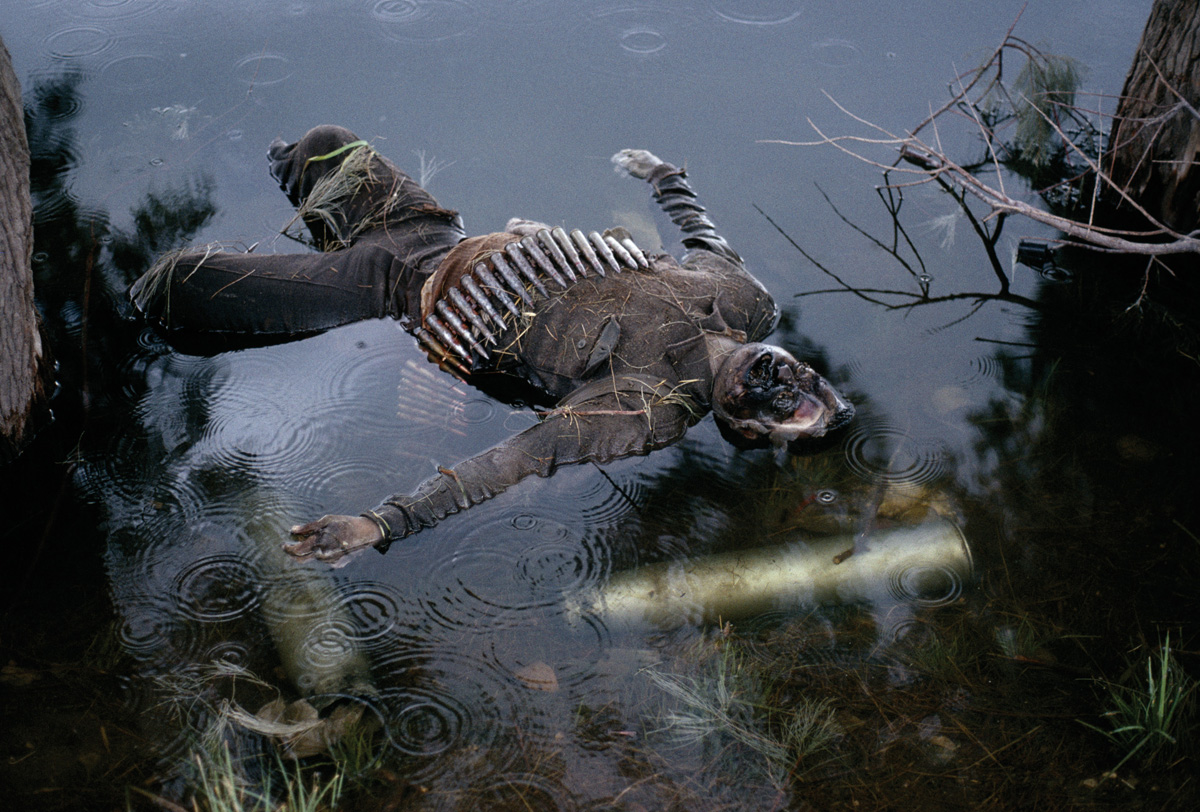

The most shocking photo by McCurry is The Dead Afghan Soldier Jalalabad, Afghanistan, 1992. This photo Surprises me because when I first saw it I thought it was just a dummy but after the second time I saw it I figured out it was a real human. Probably McCurry is trying to emphasize the death of many afghan soldiers and how crucial it can be. Looking at the appearance of the person it shows that this could be a soldier because of the bullets hanging on him and the uniform the person is wearing. Under the lake there are 2 gas containers. Those gas containers could be there for a reason. An example of a reason is that he could have died because of those gas containers. Looking at the water of the lake it looks like it might be raining and McCurry shows how sad the death was by also taking the photo during the rain. McCurry shows the depressing emotion by making the things around the person depressing. McCurry really shows how many people are crying because of wars by showing a real soldier killed by war or some other reason. Before reading this picture I thought that this could have just been a fake dummy but after reading the photo thoroughly I realized that this 'dummy' is actually a person.
McCurry's themes are usually the same. They are usually about the struggles of humanity, the joys of humanity and the cultures around the world. I think the themes he works on are fabulous because they show lots of power to the viewer. I’ve learned that photography is a tough job and you also have to use the background and the foreground as a clue to what the photo really means. Photography can bring about change to everyone by changing and viewing from a different perspective and to see the sorrow or the happiness of people’s lives. What makes a great photo is a good background, good surroundings to match the emotion, to use good colors, to use good angles and to show good meaning to the photo. A photo that lasts and endures is a photo that you are still trying to figure out the meaning. To analyze a photo you have to look at the positive and negative space, then you look at the foreground and the background of the photo, after that you describe the lines and then you just look that the photographer emphasizes something. Before McCurry I thought pictures are not worth a thousand words but after admiring his work I managed to understand these quotes. His work reflects a journey by capturing his journey around the world and the moments he will always remember.
1 comment:
You identified the themes of his work well - the struggles and joys of humanity. I liked the fact that you recognized that his work is a journey literally (his travels) and in a more abstract way (that he learnt more about people along the way). Look at your use of commas please, and replace the word 'good' with something less vanilla please. Explain why taking photos in these conflict zones was so dangerous that he had to sew film into his clothes. There is power in that fact. Capitalization - have another look. I know what you mean by the end sentence but think about the word cherish 'protect and care for (someone) lovingly' - another word in the conclusion would be more powerful? He actually says a lot on his blog about why the memories will be imprinted on his mind. Quote him to end - that is a pleasing style. I liked the fact that you explained well about the realization that the 'dummy' was actually a human, and the sky seemed to be crying for him...you could expand on this idea.
Post a Comment